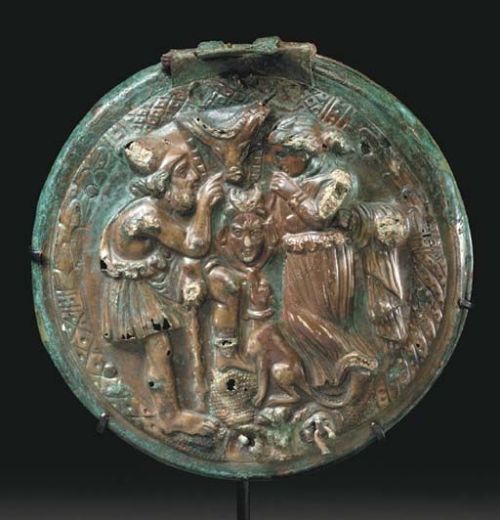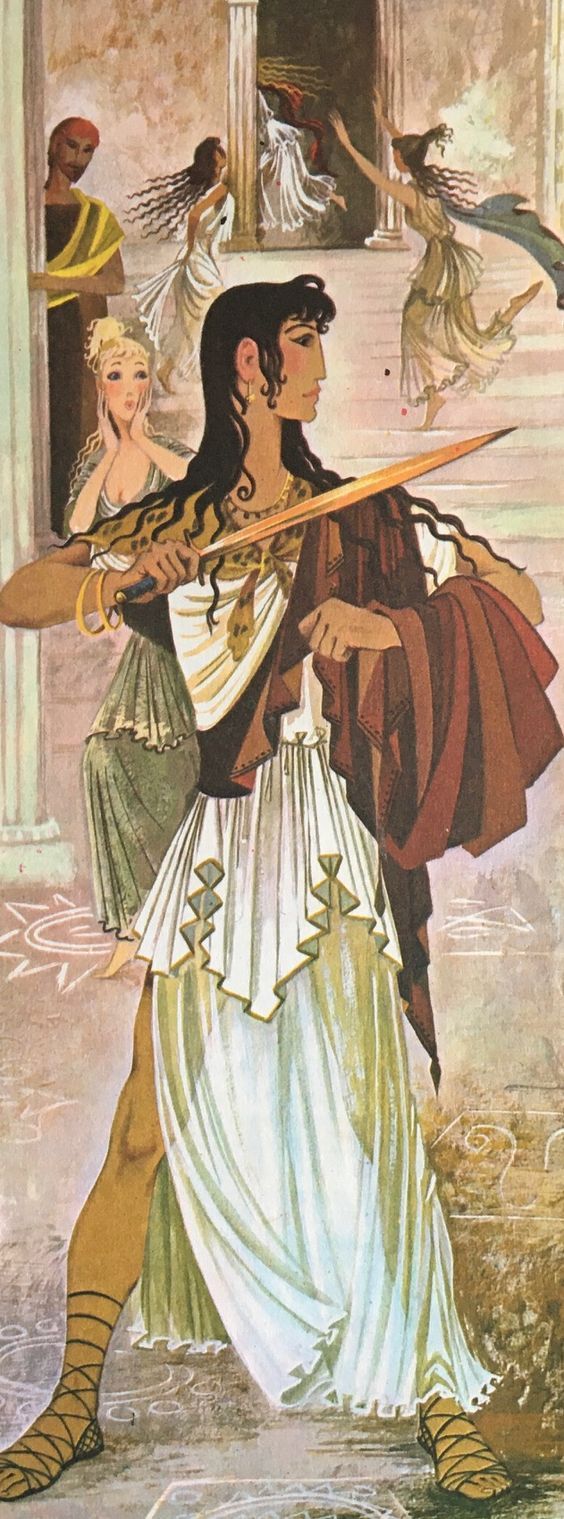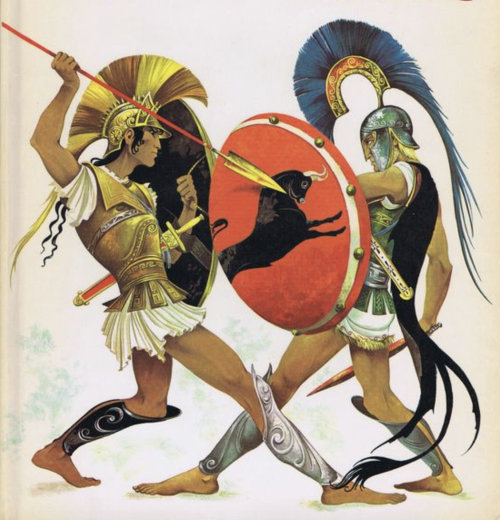There's Been Some Amount Of Academic Discussion About Paris' Two Names - Usually In Terms Of Which Is
There's been some amount of academic discussion about Paris' two names - usually in terms of which is earlier and where they come from and what epithets are used with which name. (Most of his epithets "belong" only to Alexander, if you're curious.) But, a small branch of it is "who uses what name, in-story, in the Iliad" ; Ann Suter (this woman, uhh her ideas are pretty crazy so approach with awareness of that), I.F. de Jong and, commenting on especially the latter's article, Michael Lloyd.
I lean more towards Lloyd's assessment that de Jong's premise (that "Paris" is between the Trojans and "Alexander" for the Achaeans as a sort of 'international' name) can't really be supported. But! That doesn't mean you still can't have fun with the split in names and get something in terms of character and worldbuilding out of that!
So, first of all, in the Iliad, "Alexander" is used far more than "Paris". Only Hektor ever uses "Paris" in direct speech, about or to him (we'll get back to Hektor).
Everyone else, Achaean or Trojan, uses Alexander.
Both Suter and de Jong would, in various ways, either ignore this or explain it away as a "this only happens when the Trojans are talking to Achaeans" (Hektor, before the duel), or "what is said is going to be said to Achaeans" (Priam, telling Idaeus what to report to the Achaean commanders). Honestly, that seems overly complicated and not very reasonable to me. Especially in the case of Priam, if Paris was the name he's most used to using, there is no reason for him not to use Paris and then Idaeus simply switches when reporting the speech to the Achaeans. Yes, reported speech/instructions are usually relayed verbatim, but switching a name wouldn't be changing what's actually been said.
And, anyway, coming back to Hektor, who is the one to most consistently use Paris? Also uses Alexander, when thinking to himself, in his own head. (He also uses Paris to Achilles.)
Myth-wise, in various later sources you get the very logical conclusion of "one name was given by his foster father, the other by his royal parents". (Though there's not necessarily any consistency, even with one writer, which name was given by whom.)
Given the way the Iliad prioritises Alexander, I'd go with that Alexander is the name Priam and Hecuba gave their son, even if he was going to be exposed, before giving him away. Given how Alexander is used by basically everyone to address him, this would make good sense, I think. The Achaeans would only know of Alexander, prince of Troy, and that is certainly the name most/all Trojans would use. Paris is then the name given him by his foster father. Hektor using it can be turned into a look into their relationship, because what you see is Hektor using the name of the "outsider" (by a bare technically "not" his brother), to insult his brother, when he's angry. A verbal distance to add to the emotional one, if not one that's complete and sometimes blurs.
(This doesn't take into account post-Iliad sources, where 'Paris' vastly outnumber the uses of 'Alexander'.)
More Posts from Phaespxria and Others










I just think they’re neat
Jon Bernthal / Rossy de Palma / Sevdaliza / Adrien Brody / Tamino / Sofia Coppola / Elisabeth Moss / Andy Samberg / Damiano David / Alba Flores

Cyborg Frankenstein.

I don't care if I've shared this painting five million times already, I am doing it again.
I'm smiling kicking my feet twirling my hair at this painting, alright. Pheidias is me when I give a presentation in art school. okay I will now go lie down and think about this depiction of Socrates and Alcibiades for 25 minutes because they make me insane.

So how 'bout those trailers. OMG.

Etruscan mirror, 4th-3rd century BC. This bronze mirror case shows Odysseus’s homecoming, namely him reuniting with Penelope - with his dog Argos in between the two.



I told you I found it on a dead man
In The Odyssey, Odysseus is extraordinary for the flexibility with which he can inhabit many different names, or no name at all. It is this quality of being multinamed and nameless that enables him to survive. By contrast, almost all the warriors of The Iliad yearn to have a name and a story that lasts forever. Their many names and titles, as sons and brothers and comrades and fathers and rulers, are essential to their identities, their connections with one another, and their fame after death. They fear, above all, being humiliated (cursed with a negative name), or forgotten and nameless. The lists and catalogs of names are essential to the poem’s own work, of memorializing and mourning the dead. Once the bodies return to dust, these syllables are all that remain.
– Emily Wilson, Translator's note for The Iliad.
everyone loves Predynastic Egyptian Terracotta Bowl with Human Feet. shout-out to a real one

the way that storytelling in the odyssey loops in on itself… everyone in the odyssey wants to know the odyssey. telemachus leaves for sparta in order to hear it. odysseus sits with the phaeacians deep into the night telling it. and he withholds it from people he doesn’t trust, only to reveal himself and tell it again. the sirens and demodocus sing to him about the iliad. penelope tells ithaca's bard phemius to stop singing because he has no songs about odysseus returning; if he can’t sing the odyssey, he shouldn't sing at all






Scenes from Homer by Janet & Anne Grahame Johnstone
-
 taiyoandluna09 reblogged this · 3 weeks ago
taiyoandluna09 reblogged this · 3 weeks ago -
 chaosandtwo liked this · 4 weeks ago
chaosandtwo liked this · 4 weeks ago -
 taiyoandluna09 reblogged this · 4 weeks ago
taiyoandluna09 reblogged this · 4 weeks ago -
 taiyoandluna09 liked this · 4 weeks ago
taiyoandluna09 liked this · 4 weeks ago -
 taiyoandluna09 reblogged this · 2 months ago
taiyoandluna09 reblogged this · 2 months ago -
 yellow-pebble liked this · 7 months ago
yellow-pebble liked this · 7 months ago -
 alcibiades-hacks-it liked this · 7 months ago
alcibiades-hacks-it liked this · 7 months ago -
 punkfistfights reblogged this · 7 months ago
punkfistfights reblogged this · 7 months ago -
 punkfistfights liked this · 7 months ago
punkfistfights liked this · 7 months ago -
 greatmindsfartalike liked this · 8 months ago
greatmindsfartalike liked this · 8 months ago -
 kenn-kirk liked this · 8 months ago
kenn-kirk liked this · 8 months ago -
 justalittletoclosetothesun liked this · 8 months ago
justalittletoclosetothesun liked this · 8 months ago -
 lizard-spams-your-dash-too liked this · 8 months ago
lizard-spams-your-dash-too liked this · 8 months ago -
 autismango liked this · 8 months ago
autismango liked this · 8 months ago -
 the-goddess-of-annoying reblogged this · 8 months ago
the-goddess-of-annoying reblogged this · 8 months ago -
 barbieslesbianfriend liked this · 8 months ago
barbieslesbianfriend liked this · 8 months ago -
 dilutedh2so4 liked this · 8 months ago
dilutedh2so4 liked this · 8 months ago -
 doloneia reblogged this · 8 months ago
doloneia reblogged this · 8 months ago -
 venomspecs liked this · 8 months ago
venomspecs liked this · 8 months ago -
 specialagentartemis liked this · 8 months ago
specialagentartemis liked this · 8 months ago -
 ilions-end reblogged this · 8 months ago
ilions-end reblogged this · 8 months ago -
 demonhen liked this · 1 year ago
demonhen liked this · 1 year ago -
 loveoffthefloor liked this · 1 year ago
loveoffthefloor liked this · 1 year ago -
 izz-pusee reblogged this · 1 year ago
izz-pusee reblogged this · 1 year ago -
 psychicdetectivecollector liked this · 1 year ago
psychicdetectivecollector liked this · 1 year ago -
 gingercullenboy liked this · 1 year ago
gingercullenboy liked this · 1 year ago -
 joyful-past-tense liked this · 1 year ago
joyful-past-tense liked this · 1 year ago -
 thehappybaker reblogged this · 1 year ago
thehappybaker reblogged this · 1 year ago -
 mydnyteraven liked this · 1 year ago
mydnyteraven liked this · 1 year ago -
 arthur-lesters-missed-jugular liked this · 1 year ago
arthur-lesters-missed-jugular liked this · 1 year ago -
 silvadraconis liked this · 1 year ago
silvadraconis liked this · 1 year ago -
 littlesparklight reblogged this · 1 year ago
littlesparklight reblogged this · 1 year ago -
 silessianwinds liked this · 1 year ago
silessianwinds liked this · 1 year ago -
 1-800-disasterbi liked this · 1 year ago
1-800-disasterbi liked this · 1 year ago -
 scoopac liked this · 1 year ago
scoopac liked this · 1 year ago -
 littlesparklight reblogged this · 1 year ago
littlesparklight reblogged this · 1 year ago -
 thrassa liked this · 1 year ago
thrassa liked this · 1 year ago -
 s0nat1ne liked this · 1 year ago
s0nat1ne liked this · 1 year ago -
 phaespxria reblogged this · 1 year ago
phaespxria reblogged this · 1 year ago -
 phaespxria liked this · 1 year ago
phaespxria liked this · 1 year ago -
 esteicy-blog reblogged this · 1 year ago
esteicy-blog reblogged this · 1 year ago -
 esteicy-blog liked this · 1 year ago
esteicy-blog liked this · 1 year ago -
 gangly-25 reblogged this · 1 year ago
gangly-25 reblogged this · 1 year ago -
 gangly-25 liked this · 1 year ago
gangly-25 liked this · 1 year ago
